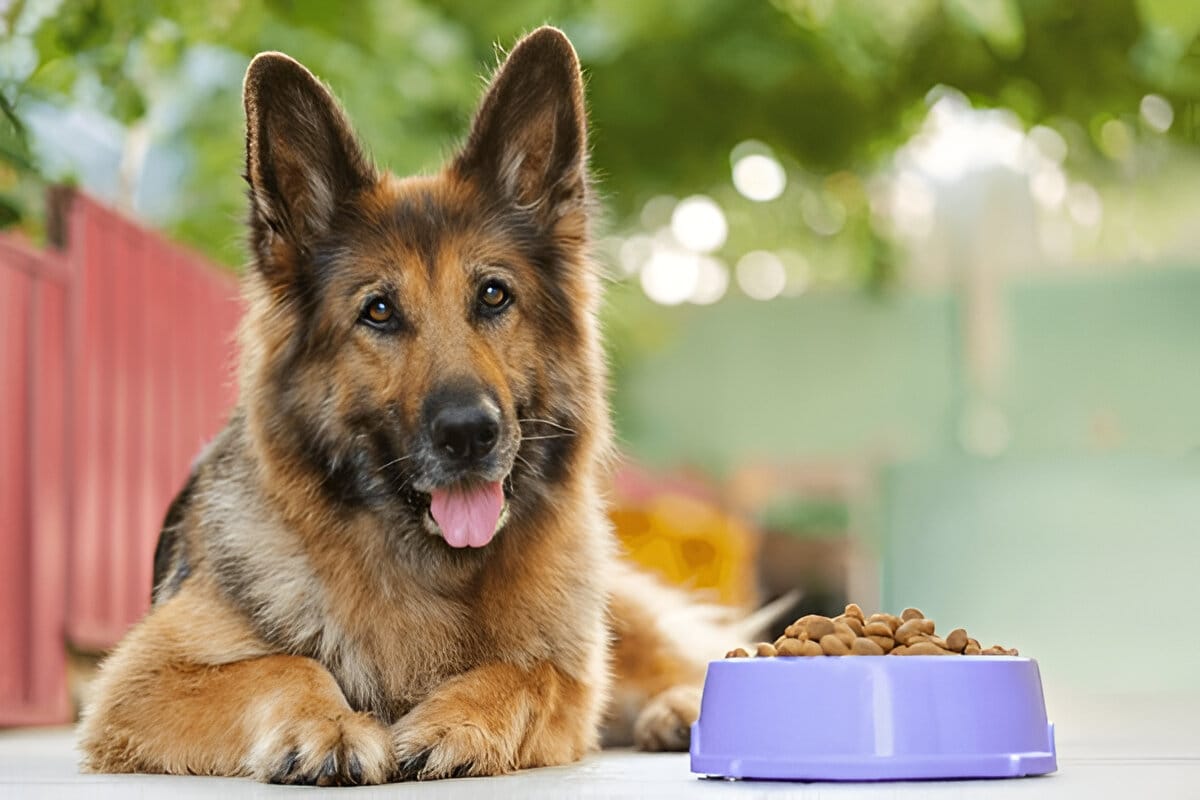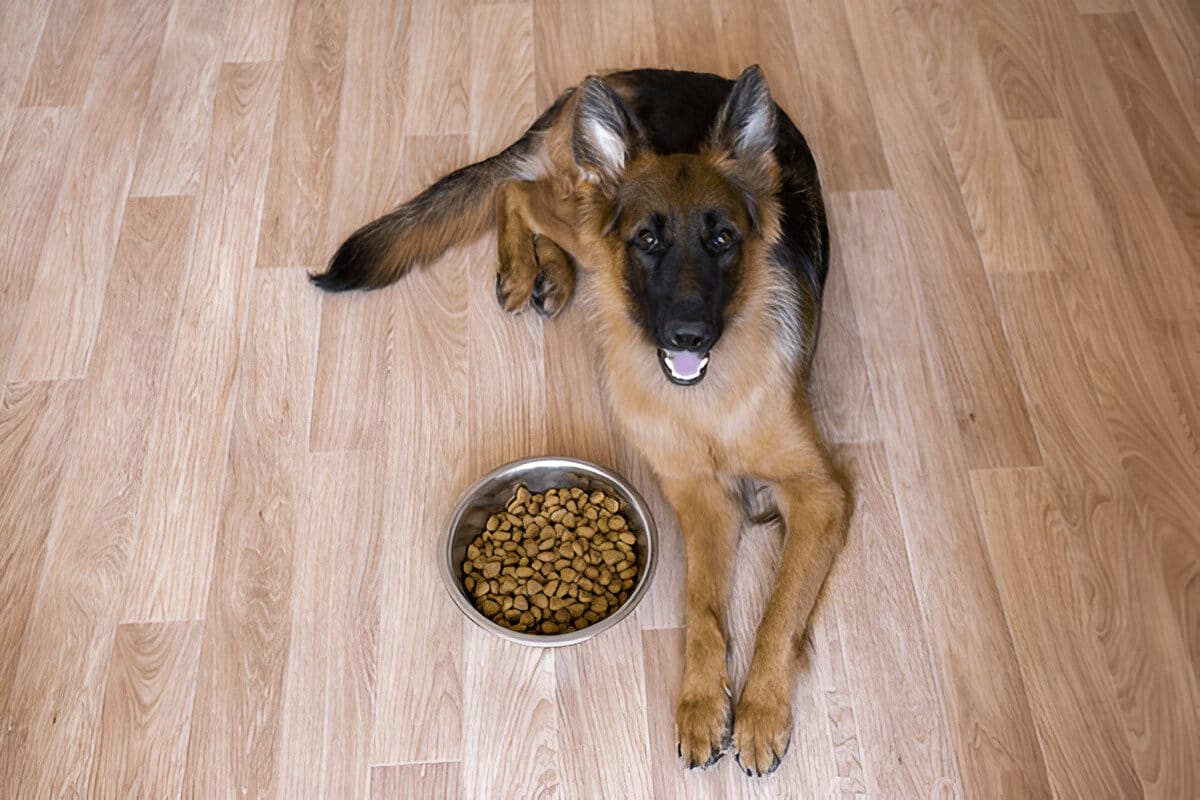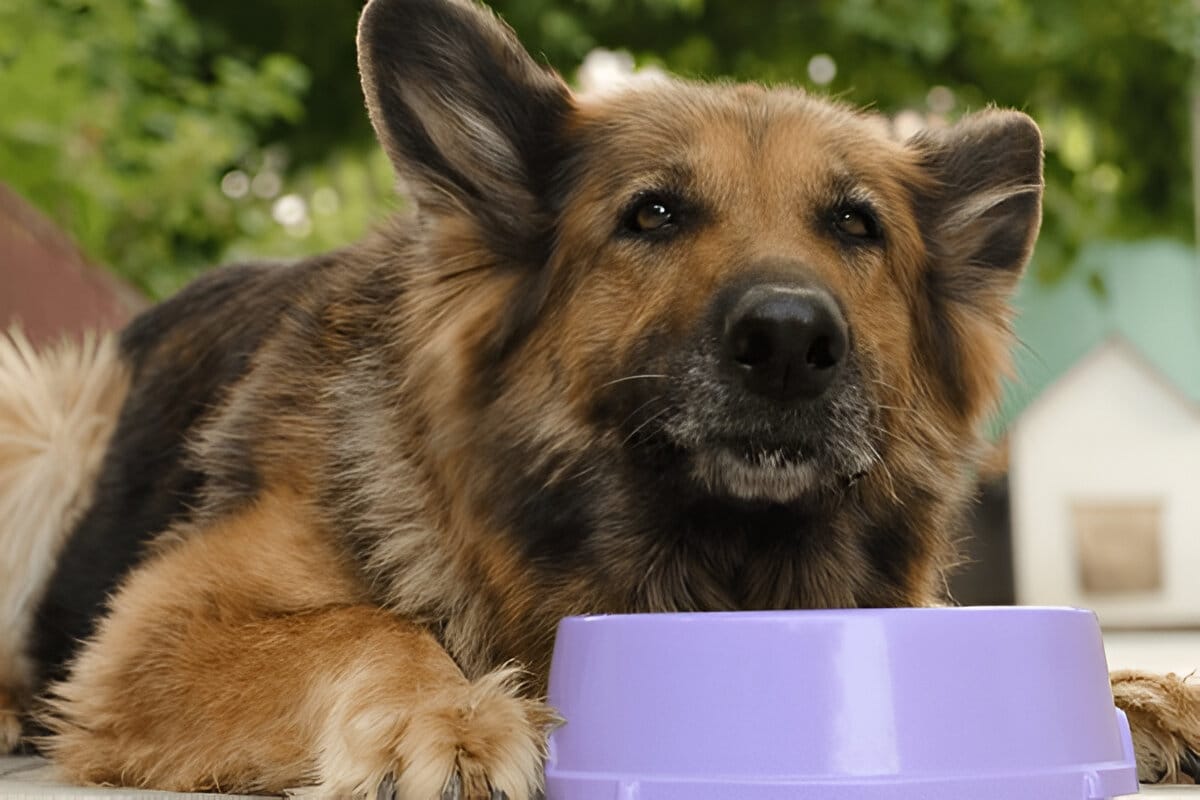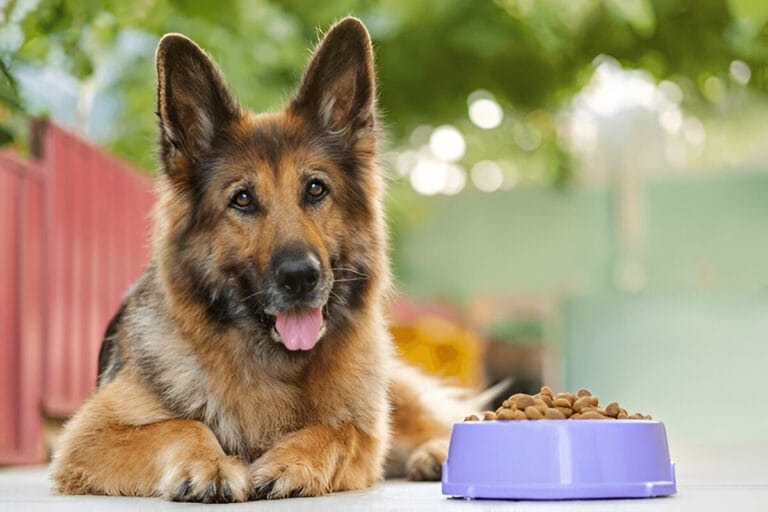German Shepherd Feeding Guide
One of the most important aspects of caring for your dog is ensuring they receive the right food to provide them with nutritious and delicious meals.
Choosing the best options for your German Shepherd might seem complex with so many types available, but once you know what diet to feed, their health and longevity improve dramatically. This guide will take you through everything your loyal companion will need to help them thrive.
Understanding why a proper raw or commercial diet matters starts with knowing their nutritional requirements – these powerful dogs demand high-protein meals that support their active lifestyle. A proper feeding chart or calculator becomes essential for weight management, as maintaining their overall well-being depends on precise portions tailored to their size, age, and activity level.
From my years of experience with these magnificent breeds, I’ve learned that quality supplements can bridge nutritional gaps, especially for working German Shepherds who burn through calories quickly during training sessions.

Photo credit: Shutterstock by Snezhana_G
Why Raw is the best food for your German Shepherd
The best dog food for your German Shepherd is undoubtedly a raw, natural, whole-food diet that can help keep them healthy and happy while providing all the nutrients needed to prevent and manage a range of common health conditions.
From obesity and dental issues to digestive problems, joint mobility concerns, arthritis, and allergy symptoms like excessive itching and skin complaints, raw feeding addresses these challenges naturally.
When deciding on nutrition, it’s essential to consider canine anatomy – their digestive system and tracts haven’t significantly evolved from their undomesticated wolves ancestors, making them perfectly suited for to fresh, meat-based diets rich in protein.
What we call species-appropriate nutrition seeks to replicate what’s nutritionally balanced according to your dog’s life stage and energy needs.
This typically includes a combination of high-quality proteins, fats, vitamins, minerals, fiber from vegetables and berries. Choosing raw means lots of variety where you can adjust individual ratios and ingredients to make sure meals are appropriate for your specific German Shepherd’s requirements.
It’s important to note that a dog’s stomach is anatomically designed to digest meat efficiently, not ferment carbohydrates – the main ingredient in kibble. Even grain-free options often contains high levels of starchy carbs including rice, potatoes, legumes, and lentils.
Feeding these puts your dog under pressure as it spikes insulin, glucagon, and cortisol throughout the day, which can tax the pancreas and in some cases lead to pancreatitis.
This inappropriate diet, coupled with the intense heat processing used to manufacture kibble, denatures proteins leading to something called advanced glycation end-products (AGEs) that cause inflammation and put strain on many vital organs.
While there’s no doubt our dogs are resilient species capable of surviving despite eating inappropriate components – after all, they need to be scavenger animals that can adapt to survive over time in our modern world – there’s a significant difference between surviving and thriving.

Photo credit: Shutterstock by Korneeva Kristina
Nutritional requirements of a German Shepherd
Knowing exactly what should make up the perfect diet for your German Shepherd to consist of begins with understanding five crucial elements for optimal health. The foundation starts with 1 superior protein from top-tier quality meat sources that fuel muscle development and athletic performance, followed by 2 vital essential fatty acids like omegas that keep their coat glossy and joints flexible.
Next comes 3 carefully measured small amounts of carbohydrates sourced from nutrient-dense vegetables, healing herbs, and antioxidant-rich berries that support digestion without causing stress to their system.
The fourth pillar includes 4 natural vitamins and minerals derived from bone meal and plant extracts that boost immunity and cellular repair processes, while the final component is 5 consistent hydration achieved through high moisture foods paired with constant access to fresh drinking water.
- Protein
When selecting what to feed your German Shepherd, always choose a diet rich in high-quality, animal-based protein sources like beef, chicken, turkey, lamb, duck, eggs, and fish – this is the most critical nutrient and essential component that contributes to optimal efficiency of your dog’s body cells, systems, and functions.
Protein impacts canine health in many ways including providing consistent energy throughout the day, builds and repairs muscles after exercise, forms new skin, hair, nails, and other tissue for growth and healing, keeps the immune system healthy against infections, and makes vital hormones, enzymes, and antibodies that regulate countless biological processes.
- Fat
Fat stands as the second most important nutrient in any dog diet, and when properly balanced, fats become essential for optimal health as they provide concentrated energy and support numerous biological processes. Dietary fats, which we generally refer to as triglyceride compounds, exist in two main types – saturated and unsaturated – and both play crucial roles when getting the balance right becomes key to your German Shepherd’s wellbeing.
These nutrients come primarily from animal sources and improve the taste and texture of food while helping to aid in the absorption of fat-soluble vitamins A, D, E, and K that your dog’s body cannot produce on its own.
The specific fatty acids like Omega-3 (including EHA, DHA, and ALA), Omega-6, and 9 (such as LA and AA) are vital for the development, structure, and function of body cells throughout your dog’s system.
When fed in correct proportions, these fats promote a healthy coat and skin while helping avoid unwanted complaints like dandruff, help maintain sharp eye function, support the nervous system, fuel brain development for better learning, reduce inflammation throughout the body, control hormones effectively, and prevent hormone imbalance in dogs.
Through my experience with German Shepherds, I’ve observed that dogs receiving balanced fat ratios display remarkable coat luster, maintain stable energy levels during intense training, and show fewer skin irritations compared to those on fat-restricted diets.
- Carbohydrate
While carbohydrates are though not considered essential nutrient requirements for dogs, incorporating a small amount from carefully chosen plant-based sources can serve important functions within your dog body systems.
Premium vegetables and select fruits provide crucial fiber for digestive health, nourishing prebiotics that become food for beneficial bacteria colonies, and protective antioxidants often lacking in meat alone feeding approaches. Even though carnivores naturally dominate their dietary needs, German Shepherds can genuinely benefit from strategic vegetation additions to their diets for optimal health outcomes.
- Natural vitamins and minerals
A raw food diet aims to replicate what dogs naturally evolved to eat in the wild – primarily meat, bone, and offal with small amount of plant ingredients that become important for your German Shepherd when adding these highly beneficial vitamins and minerals to mealtimes.
Incorporating ground bone meals while providing recreational bones for enrichment can add essential nutrients that support digestion, skin health, and dental maintenance, as bones are known as nature’s natural multivitamin due to their incredible nutrient density.
While macronutrients like fat, carbs, and protein form the foundation, micro-nutrients found in carefully selected veggies and fruits offer remarkable diversity through phytonutrients, protective antioxidants, beneficial fiber, and bioactive compounds that nourish your dog’s body cells at the deepest level.
- Water
Water remains absolutely essential for proper functioning of your dog physiology, and here’s a fascinating fact – your German Shepherd’s body is made approximately 70 percent water, making it the most vital nutrient for cells, systems, and functions including regulation of body temperature, maintaining healthy organ function, supporting digestion and absorption of nutrients, and enabling detoxification processes that helps flush harmful toxins and waste products from their system.
Preventing dehydration becomes critical because insufficient water intake can lead to serious health problems like kidney damage, heat stroke, and compromised lubrication and cushioning of joints, ultimately supporting ease of movement during daily activities and exercise.
A quality raw diet naturally contains average moisture levels of 60-70% which helps keep your German Shepherd properly hydrated, yet many owners still struggle with how to get their dogs to drink more water throughout the day – the easy fix involves placing multiple water bowls around your home and adding water directly to their food, which keeps them naturally hydrated without any fuss or special techniques needed.

Photo credit: Shutterstock by Snezhana_G
German Shepherd Raw Feeding Guide, Chart
Whilst new dog owners could always attempt to create homemade raw food meals for their German Shepherd, many feeding beginners often find that making their own nutritionally complete meals becomes quite complicated when properly formulating appropriate ratios of key ingredients – it’s absolutely essential to ensure your dog receives optimal nutrients, and going the DIY route alone can initially seem overwhelming and daunting.
Fortunately, there’s good news for those seeking a much simpler approach – choosing a trusted reputable supplier of pre-prepared meals allows you to stock your freezer with quality nutrition that’s ready at the click of a button, especially when selecting FEDIAF approved recipes such as Complete, Economy, or Core puppy formula ranges that let you rest assured your German Shepherd is receiving properly nutritionally balanced daily meals from an agency that sets rigorous nutritional standards for pet foods across Europe.
Whether you ultimately choose convenient pre-made Raw meals for no-fuss, no-nonsense, ready-prepared feeding or decide to tackle the DIY route at home, what matters most is ensuring your German Shepherd successfully makes the move toward a natural, species-appropriate diet that will properly fuel their long-term well-being regardless of their individual breed characteristics.
Through my hands-on experience working with German Shepherds across various sizes, I’ve developed this practical feeding reference guide: a 34KG adult requires approximately 680g Per-Day at an AVG – Price Per Day of £2.92, while a larger 43KG German Shepherd typically needs around 860g of food daily, with feeding costs averaging £3.70 per day – these proven Breed-Feed Amount recommendations ensure your dog receives adequate nutrition while keeping expenses manageable.
German Shepherd Weight Management
Maintaining an appropriate and healthy weight becomes essential for any dog regardless of breed, and if you’re wondering what type of food works good for loss goals, a diet packed with biologically appropriate ingredients holds the key to helping your German Shepherd shed excess pounds and achieve their ideal body condition naturally.
Expertly balanced ratios of high-quality protein, healthy fats, ground bone, offal, select vegetables, and essential vitamins and minerals support optimum health and performance while promoting sustainable weight management – the secret lies in making gradual dietary change while paying specific attention to your dog’s physical appearance and energy levels as you adapt how much you feed them every day.
The amount your German Shepherd needs depends on several critical factors including their individual metabolism, current feeding schedule, amount of exercise they gets daily, their current weigh, age, and whether you want them to gain, maintain, or lose weight over the coming months.
Conclusion
Transitioning your German Shepherd to a raw diet stands as one of the smartest choices you can make for their overall wellness and longevity. This biologically appropriate feeding method delivers everything these active, intelligent dogs require to flourish at every life stage.
You’ll likely observe remarkable improvements in their energy, coat shine, digestive health, and joint function within just a few weeks of making the switch. Whether you select ready-made raw meals or prepare homemade recipes, the key is consistency and proper nutrient balance. By prioritizing species-appropriate nutrition, you’re investing in your German Shepherd’s quality of life and ensuring they remain your loyal, healthy companion for years ahead.















